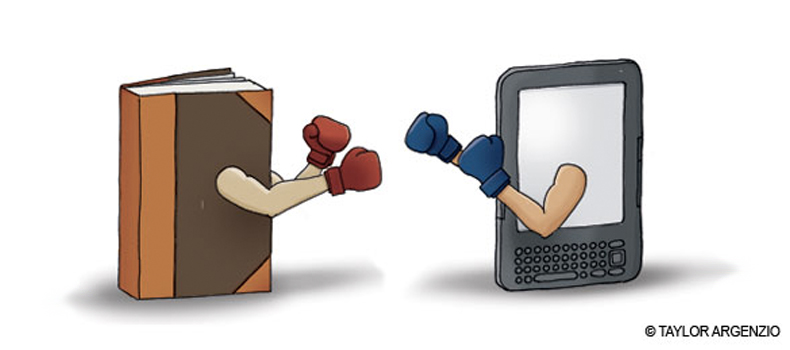Opinion: Screen versus Paper, Which is more beneficial?

Isabelle Braun ’20 / Emertainment Monthly Staff Writer
There are two different types of people in the literary world. There are those who walk into a library and breathe in the smell of paper and ink like it is their life source. They let their hands trail up and down the book binds, caressing the leather and paper that graze their fingers. Their fingers skim the pages as their eyes gaze down upon the words that engulf them into an entirely different world. Then, there are the other kinds of people.
Those individuals who simply walk into the library and choose a few books that look appealing. However, instead of buying the physical copy, they simply type the title and author into their phone to later buy on their tablet. Yet the main argument unfurling in the literary world is only after the book is chosen. Has technology interfered with our reading ability? Has it changed it for the better or the worse?
The argument centers around how people are reading. There has been a rise in people reading on their technological devices simply because it is more convenient. People always have their phones on them, so it is more convenient for them to read a quick email or article while walking into a meeting or waiting in a line at a museum. Phones and tablets—such as the Kindle and the iPad Mini—are much smaller and lighter than physical books. They take up less space in a backpack or a purse, which also leaves more room for other things to be packed.

Not only does it allow for more room, but it makes certain activities easier. According to a New York Times article titled, “How Technology Is (and Isn’t) Changing Our Reading Habits,” tablets only require only hand in order to be used. People can have a recipe on the screen while their other hand is stirring the food; moms can rock or breastfeed their babies as they read in the middle of the night. For those who stay up late, a bedside table light is no longer needed because the tablet screens light up. People can even control the brightness. These are simple functions of tablets that paper books do not have.
However, do these differences outweigh the effects on our literary skills?
There are more features on tablets than the ability to read books. When students should be reading their literature book for class, teachers often find them playing a game on their iPad. On computers, it is incredibly easy to open a new tab and go to social media. Computers and tablets—such as iPads—create so many opportunities for individuals to get distracted with other things. Therefore, people are not putting all of their focus on what they are reading. Multi-tasking does not allow the human brain to fully retain, process, and understand what is being read or studied.
The theory that tablets are decreasing literacy levels has been looked at scientifically. The Financial Review quoted The New Yorker writer Maria Konnikova in an article. In this article, Konnikova describes a Norwegian study that was about retaining information from a tablet versus retaining information from a book. During the study, individuals were told to read a short story and then answer questions based on that story. Scientists found that those who read the story from a paperback had a higher score than those who read from the screen. It did not matter that the text and the color of the background was the same for each. This study proves that reading from a book results in better retention than reading from a tablet.
Tablets have most definitely impacted the literary world today. Children know how to play a video game before they know how to read or write. Reading has been interrupted by technology. It most definitely has made it more accessible and more portable for those individuals who do not have the time to read. Yet the information is not being retained at the same level as those who read from physical books. Reading is an important quality and benefit to have throughout ones person’s life. Technology may make reading more convenient, but it takes away from the impact.